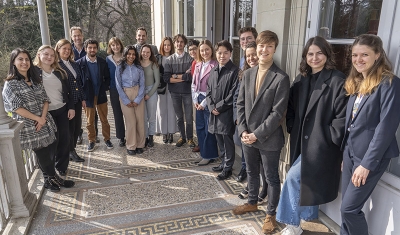The Non-International Armed Conflicts in the Central African Republic Added to our RULAC Online Portal


ICRC
15 October 2018
We have now added to our Rule of Law in Armed Conflicts (RULAC) online portal a detailed analysis and legal classification of the non-international armed conflicts (NIACs) that take place in the Central African Republic (CAR) since December 2012.
Visitors can discover an overview of the conflicts , the factual and methodological basis for their classification as NIACs, state and non-state parties and the applicable international law.
‘The CAR government, supported by the United Nations Multidimensional Integrated Mission (MINUSCA) and previously by France, is involved in a NIAC against several armed groups, such as the ex-Séléka and the anti-Balaka groups’ underlines Chiara Redaelli, Research Fellow at the Geneva Academy. ‘Recently, the intensity of armed confrontations between MINUSCA and certain armed groups has increased and led to conclude that it is also a party to the conflict. In addition, there are parallel NIACs among different armed groups which aim to secure and expand their territorial control’ she adds.
‘Our analysis shows that armed groups in CAR, notably ex-Séléka and Balaka armed groups, the Popular Front for the Rennaissance in the Central African Republic (FPRC), the Mouvement Patriotique Centrafricain (MPC), the Union for Peace in the Central African Republic (UPC) and Return, Reclamation and Rehabilitation (3R), exhibit the required degree of organization – existence of a command structure and disciplinary rules and mechanisms; ability to procure, transport and distribute arms; ability to plan, coordinate and carry out military operations; ability to negotiate and conclude agreements – to qualify these conflicts as NIACs’ stresses Chiara Redaelli.

About RULAC
Initiated in 2007, RULAC is an online portal that systematically qualifies situations of armed violence using the definition of armed conflict under international humanitarian law (IHL). While RULAC is still under development and new entries continue to be regularly added, it currently monitors more than 26 armed conflicts involving at least 39 states that visitors can discover either by browsing the map or by browsing conflicts by type or region.
‘The RULAC database is unique in the world in that it legally classifies situations of armed violence that amount to an armed conflict under IHL’ underlines Marco Sassòli, Director of the Geneva Academy.
‘This is crucial because IHL applies only in armed conflicts. Before humanitarian players, civil servants or academics can invoke IHL or analyze whether IHL was violated, they must know whether it applies. Outside armed conflicts, only international human rights law applies’ he adds.









